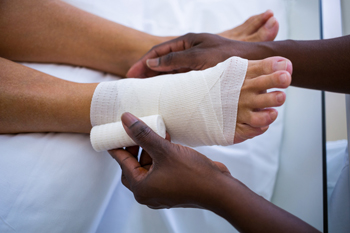Anyone can develop foot ulcers – but conditions such as neuropathy, poor circulation, foot deformities (like a bunion or hammertoe), or uncontrolled blood sugar, increase their likelihood. Foot ulcers are especially common among diabetics, and if left untreated can cause serious problems, even amputation of a foot or limb. The main culprit is a lack of feeling of pain, which leads to ignoring sores or wounds as they occur. Poor circulation lowers the body’s ability to heal properly, increasing the risk of foot ulcers developing. It is extremely important to keep the ulcer from becoming infected. Keep the area clean and bandaged, cleanse the wound daily, avoid walking barefoot, and monitor glucose levels. If the wound becomes infected, however, it is strongly suggested that you seek the regular care of a podiatrist who can examine the infected area and create an ongoing treatment plan. Such measures may include prescribing antibiotics, cleansing the wound, and even hospitalization, depending on the severity.
Wound care is an important part in dealing with diabetes. If you have diabetes and a foot wound or would like more information about wound care for diabetics, consult with Dr. Odin De Los Reyes from Connecticut. Our doctor will assess your condition and provide you with quality foot and ankle treatment.
What Is Wound Care?
Wound care is the practice of taking proper care of a wound. This can range from the smallest to the largest of wounds. While everyone can benefit from proper wound care, it is much more important for diabetics. Diabetics often suffer from poor blood circulation which causes wounds to heal much slower than they would in a non-diabetic.
What Is the Importance of Wound Care?
While it may not seem apparent with small ulcers on the foot, for diabetics, any size ulcer can become infected. Diabetics often also suffer from neuropathy, or nerve loss. This means they might not even feel when they have an ulcer on their foot. If the wound becomes severely infected, amputation may be necessary. Therefore, it is of the upmost importance to properly care for any and all foot wounds.
How to Care for Wounds
The best way to care for foot wounds is to prevent them. For diabetics, this means daily inspections of the feet for any signs of abnormalities or ulcers. It is also recommended to see a podiatrist several times a year for a foot inspection. If you do have an ulcer, run the wound under water to clear dirt from the wound; then apply antibiotic ointment to the wound and cover with a bandage. Bandages should be changed daily and keeping pressure off the wound is smart. It is advised to see a podiatrist, who can keep an eye on it.
If you have any questions, please feel free to contact our offices located in Southbury and Farmington, CT . We offer the newest diagnostic and treatment technologies for all your foot care needs.

